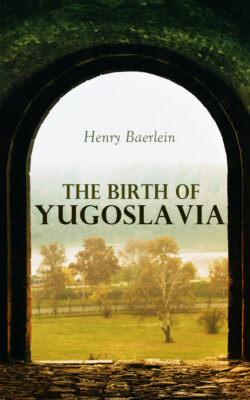Читать книгу The Birth of Yugoslavia - Henry Baerlein - Страница 58
На сайте Литреса книга снята с продажи.
NAPOLEON'S SCHEMES ARE ROUGHLY INTERRUPTED
ОглавлениеThe transactions of the British at Vis (Lissa) were such as to make the people of Illyria very discontented with Napoleon, not so much on account of his mischance at sea, as of the disagreeable effects thereof upon themselves. The British blockade had ruined the local merchant service, while the consequent state of a province which had necessarily to be revictualled by sea was compared with the flourishing fortunes of Vis. Before the British definitely occupied that island with its glorious harbour—2½ kilometres in length by 1 kilometre in breadth—they had to secure themselves by two naval engagements. In October 1810 the French-Italian attack was nearly successful, and in the following March came the great fight when Dubourdieu pitted himself against Commodore Hoste. Not counting a few smaller ships, the French had four frigates, each armed with 44 guns, and two corvettes of 32 guns. The British had the Amphion and the Cerberus, each armed with 60 guns, the Active with 44 and the Volage with 22. The Italians having slow ships, arrived late, but fought very well. What lost Dubourdieu his chances was the separation of his squadron, which allowed the British to engage them one after another. Dubourdieu on the Favorite, his captain and two lieutenants were killed; the captain of the Flore lost an arm; the captain of the Bellona had both legs amputated, and died on the next day; Pasqualijo, captain of the Corona, wished to surrender his sword to Hoste, but as he had fought so nobly Hoste refused to take it. Pasqualijo was removed to Malta, and after a few months set at liberty. On the British side the losses were also severe. Most of the crew of the Amphion were either killed or wounded, Hoste being among the latter. Of 254 on board the Cerberus only 26 were untouched. It is said that the French and Italians had about 200 killed and 500 wounded. Dubourdieu's fault was merely an excess of intrepidity; the French have called a cruiser after him. Their opinion at the time, according to their historians,[38] was that the British were superior in officers and men and ships—constant cruising on the Adriatic had brought them near perfection. Among the incidents recorded is that of one of the Amphion's cadets who was doing police work at the fort; in despair at being out of the battle he swam to his ship. A fusillade from the Favorite put some shot in his leg. On reaching the Amphion he was bandaged and went to his post. His name was Farell or Farewell. … After this the British made themselves at home upon that mountainous, rich isle of palm-trees and vineyards that were praised of old by Agatharchides. Sir G. D. Robertson, the Governor, had two companies of the 35th Regiment, besides Swiss, Corsican and Calabrian contingents. There was great prosperity. Sometimes a hundred corsairs would be in the harbour, waiting for a favourable wind. On their return they would have splendid cargoes, and the goods which cost so little were sold at absurd prices. Rent was high, there were not shops enough for the tailors, carpenters, goldsmiths, pastry-cooks who landed there, chiefly from Italy; the people therefore pulled old boats on to the shore and lived in them. There one could buy the best Turkish tobacco, and cigars were advertised as "the finest cigars for gentlemen and ladies." Italian and Dalmatian smugglers flocked to Vis in search of goods, and even French officers could sometimes not resist wearing the cool garments from the East Indies. In two years the population increased from four to eleven thousand.
Illyria's enemies on land were also aided by the British. In 1813, when the Austrians, under General Tomassich, penetrated into the Illyrian provinces, the Croat inhabitants threw in their lot with them. They and the British surrounded Zadar, which fell after a siege of six weeks. At Dubrovnik—whose merchantmen she had mostly captured or sunk—England assisted the population, nobles and commoners, in a revolt against the French. One object of the citizens was to restore the Republic, but in a democratic form.
